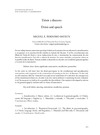Please use this identifier to cite or link to this item:
https://accedacris.ulpgc.es/jspui/handle/10553/74920
| DC Field | Value | Language |
|---|---|---|
| dc.contributor.author | Perdomo Batista, Miguel Angel | en_US |
| dc.date.accessioned | 2020-10-21T09:39:34Z | - |
| dc.date.available | 2020-10-21T09:39:34Z | - |
| dc.date.issued | 2020 | en_US |
| dc.identifier.issn | 0071-1713 | en_US |
| dc.identifier.other | Scopus | - |
| dc.identifier.uri | https://accedacris.ulpgc.es/handle/10553/74920 | - |
| dc.description.abstract | In this work we will show how the deixis participates in the metafictional and metadiscursive construction, and, in general, in the construction of meaning at the level of discourse. To this end, we will examine a fable by Tomás de Iriarte and several translations of it and show the consequences of this metadiscursive function. In order to do this, and in addition to examining the texts indicated, it will be necessary to clarify as far as possible the idea of deixis. Our analysis is developed in relation to the gramaticography tradition and the theory of enunciation. | en_US |
| dc.description.abstract | En este trabajo mostraremos cómo participa la deixis en la construcción metaficcional y metadiscursiva y, en general, en la construcción del sentido en el plano del discurso. A tal fin, examinaremos una fábula de Tomás de Iriarte y varias traducciones de esta, y mostraremos las consecuencias de esta función metadiscursiva. Para ello, y además de examinar los textos señalados, será preciso aclarar en lo posible la idea de deixis. Nuestro análisis se desarrolla en relación con la tradición gramaticográfica y la teoría de la enunciación. | en_US |
| dc.language | spa | en_US |
| dc.relation | ESCENARIO GALDÓS. Textos, pensamiento y escenarios de Benito Pérez Galdós. | en_US |
| dc.relation.ispartof | Estudios Filológicos | en_US |
| dc.source | Estudios Filológicos [ISSN 0071-1713], n. 65, p. 195-212, (Enero 2020) | en_US |
| dc.subject | 5701 Lingüística aplicada | en_US |
| dc.subject.other | Deixis | en_US |
| dc.subject.other | Enunciation | en_US |
| dc.subject.other | Meaning | en_US |
| dc.subject.other | Metafiction | en_US |
| dc.subject.other | Pronoun | en_US |
| dc.subject.other | Significado | en_US |
| dc.subject.other | Enunciación | en_US |
| dc.subject.other | Metaficción | en_US |
| dc.subject.other | Pronombre | en_US |
| dc.title | Deixis y discurso | en_US |
| dc.title.alternative | Deixis and speech | en_US |
| dc.type | info:eu-repo/semantics/Article | en_US |
| dc.type | Article | en_US |
| dc.identifier.doi | 10.4067/S0071-17132020000100195 | en_US |
| dc.identifier.scopus | 85092073490 | - |
| dc.contributor.authorscopusid | 57211000795 | - |
| dc.identifier.eissn | 0717-6171 | - |
| dc.description.lastpage | 212 | en_US |
| dc.identifier.issue | 65 | - |
| dc.description.firstpage | 195 | en_US |
| dc.investigacion | Artes y Humanidades | en_US |
| dc.type2 | Artículo | en_US |
| dc.utils.revision | Sí | en_US |
| dc.date.coverdate | Enero 2020 | en_US |
| dc.identifier.ulpgc | Sí | en_US |
| dc.description.sjr | 0,137 | |
| dc.description.jcr | 0,108 | |
| dc.description.sjrq | Q1 | |
| dc.description.jcrq | Q4 | |
| dc.description.ahci | AHCI | |
| dc.description.ssci | SSCI | |
| dc.description.erihplus | ERIH PLUS | |
| item.fulltext | Con texto completo | - |
| item.grantfulltext | open | - |
| crisitem.project.principalinvestigator | Márquez Montes, Carmen | - |
| crisitem.author.dept | GIR Investigaciones literarias y lingüísticas en español | - |
| crisitem.author.dept | Departamento de Filología Hispánica, Clásica y de Estudios Árabes y Orientales | - |
| crisitem.author.orcid | 0000-0002-5019-2368 | - |
| crisitem.author.parentorg | Departamento de Filología Hispánica, Clásica y de Estudios Árabes y Orientales | - |
| crisitem.author.fullName | Perdomo Batista, Miguel Angel | - |
| Appears in Collections: | Artículos | |
Page view(s)
168
checked on Jan 25, 2025
Download(s)
98
checked on Jan 25, 2025
Google ScholarTM
Check
Altmetric
Share
Export metadata
Items in accedaCRIS are protected by copyright, with all rights reserved, unless otherwise indicated.
